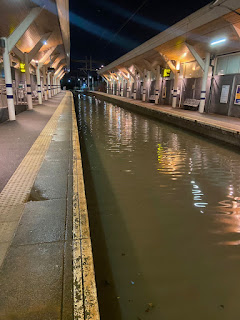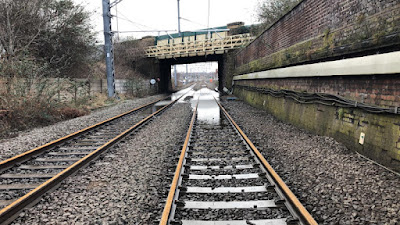News: Year delay for new tram stop in Rotherham
A new tram-train stop seen as a key enhancement in improving the public transport system of the Rotherham area, has been delayed, and costs have increased.
Plans were approved last year for a £6.9m project at Templeborough for a new stop and park & ride facility at the.Magna Science Adventure Centre.
Legal issues and delays associated with obtaining the necessary railway consents has pushed the completion date to November 2025.
When South Yorkshire Mayoral Combined Authority (SYMCA) signed a funding agreement last year, it said that a start on site was due in Spring 2024 with forecast completion and entry into service Autumn/Winter 2024.
The tram-train line runs to the rear of the site and making use of the existing underutilised parking supply at Magna is seen as a cost-effective way of increasing Park & Ride facilities in the area.
A station with two, 30m long platforms on land next to the car park at Magna is set to be built, further down past the AquaTek outdoor play area. It is described as having basic facilities including a shelter, information boards, lighting, CCTV and cycle parking. A bridge, with lifts, and a fence running between the two tracks are also included.
Advertisement
An update to SYMCA now explains: "After many months of delay, due mainly to obtaining the necessary rail industry consents for the works, this project has now reached the Delivery Phase and final approval is now sought to appoint Network Rail (NWR) to undertake construction of the new Tram Train station at Magna.
"Unfortunately, with the passage of time costs have increased and NWR’s estimated costs for the Delivery Phase have since risen to £7,074,541 an increase of £214,892."
The report states that an implementation agreement with Network Rail went unsigned as the terms and conditions could not be confirmed, specifically in relation to the proposed lease of the new station. Delays were also encountered with obtaining the necessary railway consents required to implement the station.
AmcoGiffen has been appointed the principal contractor and its price has increased, driven by inflation. There has also been an increase in design costs for design management and temporary works.
The project is back by the Government's Transforming Cities Fund (TCF).
Previous transport projects in Rotherham suffered delays due to Network Rail, including the revamp of Rotherham Central station and the tram-train being brough to Parkgate.
Images:
Read more...
Plans were approved last year for a £6.9m project at Templeborough for a new stop and park & ride facility at the.Magna Science Adventure Centre.
Legal issues and delays associated with obtaining the necessary railway consents has pushed the completion date to November 2025.
When South Yorkshire Mayoral Combined Authority (SYMCA) signed a funding agreement last year, it said that a start on site was due in Spring 2024 with forecast completion and entry into service Autumn/Winter 2024.
The tram-train line runs to the rear of the site and making use of the existing underutilised parking supply at Magna is seen as a cost-effective way of increasing Park & Ride facilities in the area.
A station with two, 30m long platforms on land next to the car park at Magna is set to be built, further down past the AquaTek outdoor play area. It is described as having basic facilities including a shelter, information boards, lighting, CCTV and cycle parking. A bridge, with lifts, and a fence running between the two tracks are also included.
Advertisement
An update to SYMCA now explains: "After many months of delay, due mainly to obtaining the necessary rail industry consents for the works, this project has now reached the Delivery Phase and final approval is now sought to appoint Network Rail (NWR) to undertake construction of the new Tram Train station at Magna.
"Unfortunately, with the passage of time costs have increased and NWR’s estimated costs for the Delivery Phase have since risen to £7,074,541 an increase of £214,892."
The report states that an implementation agreement with Network Rail went unsigned as the terms and conditions could not be confirmed, specifically in relation to the proposed lease of the new station. Delays were also encountered with obtaining the necessary railway consents required to implement the station.
AmcoGiffen has been appointed the principal contractor and its price has increased, driven by inflation. There has also been an increase in design costs for design management and temporary works.
The project is back by the Government's Transforming Cities Fund (TCF).
Previous transport projects in Rotherham suffered delays due to Network Rail, including the revamp of Rotherham Central station and the tram-train being brough to Parkgate.
Images:





























